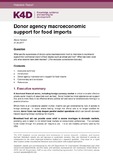| dc.contributor.author | Ferrand, Alexis | |
| dc.date.accessioned | 2017-07-20T15:37:23Z | |
| dc.date.available | 2017-07-20T15:37:23Z | |
| dc.date.issued | 2017-03-31 | |
| dc.identifier.citation | Ferrand, A. (2017). Donor Agency Macroeconomics support for food reports. K4D Helpdesk Report. Brighton, UK: Institute of Development Studies. | en |
| dc.identifier.uri | https://opendocs.ids.ac.uk/opendocs/handle/20.500.12413/13113 | |
| dc.description.abstract | A functional financial sector, including foreign currency market is critical to enable effective
private sector imports of essentials such as food. Donor funded technical assistance can support
this, and is more likely to be effective where political will and security conditions are moving in a
positive direction.
Where there is an operational parallel market, imports can get constrained by lack of access to
foreign exchange. In cases where trading through the official rate is no longer credible for
donors, donor flows can help deepen parallel market operations which can benefit domestic
traders requiring foreign exchange for imports.
Monetised food aid can provide some relief to severe shortages in domestic markets,
providing care is taken to not distort local markets or consumption preferences. The domestic
funds raised through this process will require a use. It is an aid modality primarily used by the
USA.
Concessional credit lines from bilateral sources exist where there is the political interest to underwrite the risk. However OECD bilateral donors are generally risk adverse in terms of export credit to fragile states. Most aid-related funding to support balance of payments, which in turn help support food imports in low income countries, is channelled through subsidised International Financial Institution (IFI) credit lines.
There are some cases where bilateral donors have worked to facilitate financial flows in crisis affected states to directly or indirectly support imports; in Somalia’s case there was considerable effort to avoid hawala1 remittance flows being constrained, which are critical for financing food imports into Somalia. In Zimbabwe, a donor fund that guarantees foreign exchange payment of maize imports against domestic payments has recently been set up to help ease an acute need for staple food imports. | en |
| dc.language.iso | en | en |
| dc.publisher | Institute of Development Studies | en |
| dc.relation.ispartofseries | K4D Helpdesk Report;058 | |
| dc.relation.ispartofseries | K4D Helpdesk Report;059 | |
| dc.rights.uri | https://www.nationalarchives.gov.uk/doc/open-government-licence/version/3/ | en |
| dc.subject | Economics | en |
| dc.subject | Economic Development | en |
| dc.subject | Finance | en |
| dc.subject | Governance | en |
| dc.title | Donor Agency Macroeconomic Support for Food Imports | en |
| dc.type | Helpdesk | en |
| dc.rights.holder | DFID | en |
| dcterms.dateAccepted | 2017-03-31 | |
| rioxxterms.funder | Default funder | en |
| rioxxterms.identifier.project | K4D | en |
| rioxxterms.version | AO | en |
| rioxxterms.funder.project | 9ce4e4dc-26e9-4d78-96e9-15e4dcac0642 | en |

